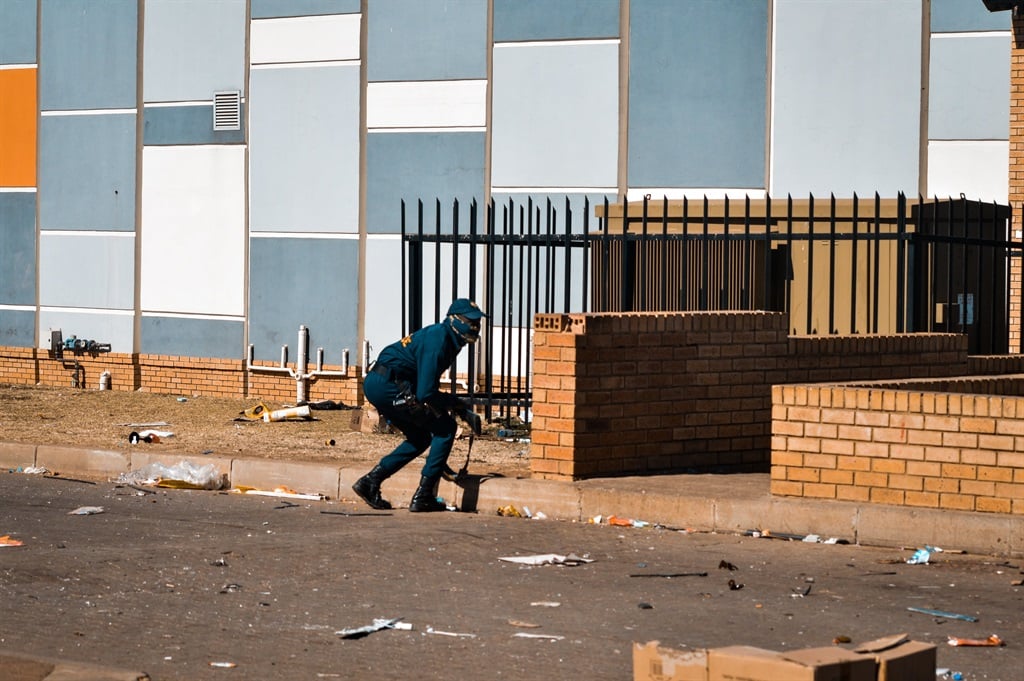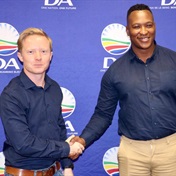
The recent South African Human Rights report into the July unrest exonerates jacob Zuma and fails to answer four important questions, writes Imraan Buccus.
The South African Human Right’s Commission report on the 2021 riots and sabotage is another expensive failure. Titled "July’s People" after a novel by the Nobel Laureate Nadine Gordimer, it has none of the great writer's precision.
It feels like it was pulled together by an undergraduate student with chunks of text being dumped into a document rather than any serious analysis being developed.
At times, it states the obvious, and at other times, it ignores the obvious. Some of the text dumped into the report has no apparent relevance of any sort to the events of July 2021. The quality of the report is inferior.
READ | July unrest: Alleged instigators vow to keep flying flag for Zuma
No university professor would accept work this shoddy from a post-graduate student. It's claim that there is no evidence linking the jailing of Jacob Zuma to the events of July 2021 is simply ludicrous. Shamefully, a news report headlined "Report reveals 2021 unrest was not related to Zuma’s incarceration" repeats this patently ridiculous claim as if it were fact.
Thankfully, many other media reports have been more circumspect, with some pointing out that the report failed to answer pressing questions and was generally poorly put together.
We had a good sense of some of what was happening in real-time as the events of July 2021 unfolded. That initial sense of things has stood up well over time. It came from grassroots activists on the ground and the handful of academics and journalists with grassroots networks.
That understanding is as follows:
- Prior to Zuma’s incarceration, the law was openly defied by tiny groups of men claiming to be MK veterans. This included attacks on migrant-run stalls in central Durban, as well as all kinds of threats of violence. The police stood down and allowed this to happen without making any attempt to assert the rule of law.
- Prior to Zuma’s incarceration, there were also covert attacks on trucks on the N3 by people who have yet to be identified, but seemed to be linked to a highly xenophobic and pro-Zuma truck drivers' organisation.
- Immediately after Zuma’s incarceration, very small groups of people from ANC branches made attempts to blockade roads. Although these attempts were desultory, the police did not intervene.
- Ordinary people who had been struggling with severe hunger after Covid-19 and the withdrawal of the Covid-19 grant took advantage of the obvious breakdown in the rule of law to loot food on a massive scale. This turned into what some experts have called the largest food riot anywhere in the world this century. Numerous sources, including grassroots activists, academics connected to grassroots organisations and journalists on the ground, confirmed that the food riot was not a pro-Zuma riot. It was simply a classic food riot.
- As the food riot progressed highly organised groups of men began to engage in well-orchestrated acts of sabotage against important infrastructure. These men were acting with the sort of precision that one associates with military and intelligence forces and were clearly well organised. These actions were not spontaneous and had the character of an attempted insurrection.
- The initial food riot degenerated into a general orgy of looting as it intersected with the organised campaign of sabotage when it targeted malls and warehouses. Well-known figures actively pushed the line that an insurrection in support of Zuma was under way.
- As the police continued to stand down, middle-class residents began to arm and organise themselves. In some neighbourhoods, this became racialised with terrible consequences.
We knew all of this at the time, and we know it now. No credible observer thinks that the food riot was a pro-Zuma riot or that it was in any way led or incited by pro-Zuma forces.
Like all classic food riots it was a spontaneous event lit with a spark. In this case, the spark was the public breakdown in law and order as the police stood down.
READ | July unrest: SAHRC's finding of no link to Zuma's jailing contradicted by earlier report
It is obvious to all credible observers that the acts of sabotage organised with military precision were an attempt at an insurrection, even a revolution, and that this could only have been driven by pro-Zuma forces. It is also obvious that these actions amounted to treason.
The riots cost more than 350 lives, caused more than R50 billion of damage to the economy, destroyed many businesses and led to a massive flight of skilled professionals out of KwaZulu-Natal to Cape Town and abroad. Everybody came out worse off, whether middle class or poor.
The four most urgent questions that we don't have answers to are as follows:
- Why did the police stand down from the beginning to the end of the crisis? Was this incompetence or cowardice or were powerful elements in the police tacitly supporting the attempt at an insurrection? We do know that Zuma had captured parts of SA's security apparatus and the police force, especially in KwaZulu-Natal.
- Who were the men who acted covertly to attack trucking on the N3? Were they linked to the ANC, MK veterans, the police or other security forces?
- Who planned, coordinated and led the attacks on infrastructure? Were these people linked to the ANC, MK veterans, the police or other security forces?
- Why has there been no proper investigation, let alone mass arrests of the men who, engaging in open treason, led the attacks on trucks and various kinds of infrastructure?
The Human Rights Commission report makes no real attempt to answer these questions and farcically claims that the riots were not driven by poverty and that the sabotage was not linked to pro-Zuma forces.
One is left wondering if the report failed to answer the most important questions, and made the laughable claim that there was no link to Zuma's incarceration because the ANC does not want to acknowledge how deeply it was compromised by the rot of the Zuma years.
The report is more than just another waste of taxpayers' money. Its failure to ask and answer the more pressing questions about the events of July 2021 leaves us all in the dark as Zuma talks of war once more.
With the progressive intellectuals in the ANC likening Zuma's new MK party to Inkatha, Renamo and Unita, and grassroots activists in Durban reporting that it is mobilising on a crude ethnic basis, it is incumbent on the state to give us well-researched and credible answers to the outstanding questions about the July 2021 events and to act decisively against those who committed treason.
The destruction of July 2021 was sparked by the impunity given to the public commission of unlawful, threatening and violent acts by tiny groups of Zuma supporters. It turned into a fireball of mass destruction because impunity was also given to the men openly organising a campaign of sabotage against crucial infrastructure.
That impunity has to come to an end. The SAHRC has failed. We will now need to look elsewhere for answers.
- Dr Imraan Buccus is a political analyst
*Want to respond to the columnist? Send your letter or article to opinions@news24.com with your name and town or province. You are welcome to also send a profile picture. We encourage a diversity of voices and views in our readers' submissions and reserve the right not to publish any and all submissions received.
Disclaimer: News24 encourages freedom of speech and the expression of diverse views. The views of columnists published on News24 are therefore their own and do not necessarily represent the views of News24.




 Publications
Publications
 Partners
Partners























